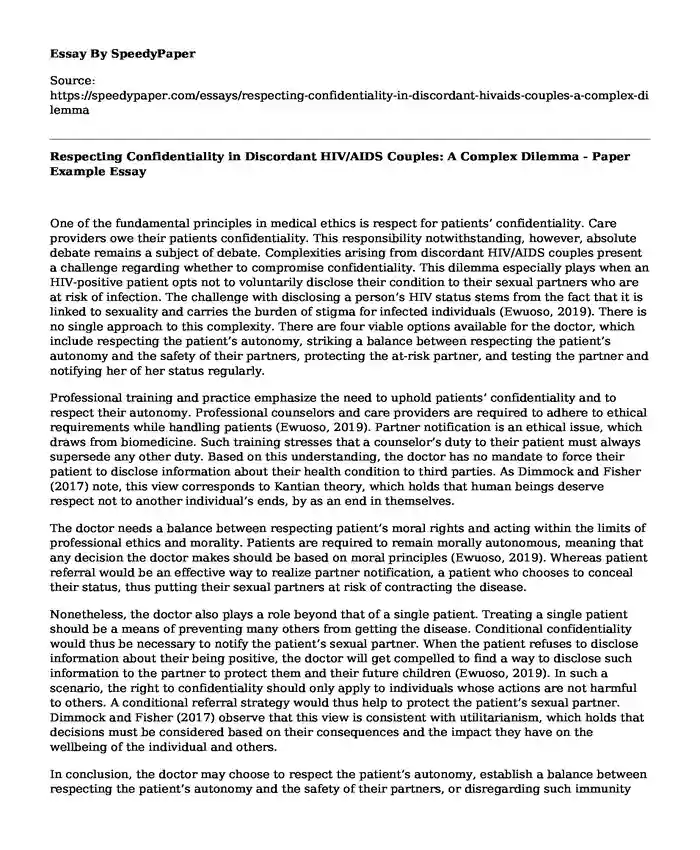
| Type of paper: | Essay |
| Categories: | Medicine Healthcare HIV Ethical dilemma |
| Pages: | 3 |
| Wordcount: | 657 words |
One of the fundamental principles in medical ethics is respect for patients’ confidentiality. Care providers owe their patients confidentiality. This responsibility notwithstanding, however, absolute debate remains a subject of debate. Complexities arising from discordant HIV/AIDS couples present a challenge regarding whether to compromise confidentiality. This dilemma especially plays when an HIV-positive patient opts not to voluntarily disclose their condition to their sexual partners who are at risk of infection. The challenge with disclosing a person’s HIV status stems from the fact that it is linked to sexuality and carries the burden of stigma for infected individuals (Ewuoso, 2019). There is no single approach to this complexity. There are four viable options available for the doctor, which include respecting the patient’s autonomy, striking a balance between respecting the patient’s autonomy and the safety of their partners, protecting the at-risk partner, and testing the partner and notifying her of her status regularly.
Professional training and practice emphasize the need to uphold patients’ confidentiality and to respect their autonomy. Professional counselors and care providers are required to adhere to ethical requirements while handling patients (Ewuoso, 2019). Partner notification is an ethical issue, which draws from biomedicine. Such training stresses that a counselor’s duty to their patient must always supersede any other duty. Based on this understanding, the doctor has no mandate to force their patient to disclose information about their health condition to third parties. As Dimmock and Fisher (2017) note, this view corresponds to Kantian theory, which holds that human beings deserve respect not to another individual’s ends, by as an end in themselves.
The doctor needs a balance between respecting patient’s moral rights and acting within the limits of professional ethics and morality. Patients are required to remain morally autonomous, meaning that any decision the doctor makes should be based on moral principles (Ewuoso, 2019). Whereas patient referral would be an effective way to realize partner notification, a patient who chooses to conceal their status, thus putting their sexual partners at risk of contracting the disease.
Nonetheless, the doctor also plays a role beyond that of a single patient. Treating a single patient should be a means of preventing many others from getting the disease. Conditional confidentiality would thus be necessary to notify the patient’s sexual partner. When the patient refuses to disclose information about their being positive, the doctor will get compelled to find a way to disclose such information to the partner to protect them and their future children (Ewuoso, 2019). In such a scenario, the right to confidentiality should only apply to individuals whose actions are not harmful to others. A conditional referral strategy would thus help to protect the patient’s sexual partner. Dimmock and Fisher (2017) observe that this view is consistent with utilitarianism, which holds that decisions must be considered based on their consequences and the impact they have on the wellbeing of the individual and others.
In conclusion, the doctor may choose to respect the patient’s autonomy, establish a balance between respecting the patient’s autonomy and the safety of their partners, or disregarding such immunity because it risks the life of another party. Whichever approach, the doctor must ensure that the patient does not suffer stigma or discrimination, while the sexual partner does not get infected in the end. The balance should ensure that both the patient and their partner have their interests served. The ethical approach chosen must result in the protection of the patient and the at-risk partner. A hybrid of the Kantian and utilitarian perspectives would help to realize such a balance and ensure that the needs of both parties get addressed appropriately.
References
Dimmock, M., & Fisher, A. (2017). Ethics for A-level. Open Book Publishers.
Ewuoso, C. (2019). Addressing the conflict between partner notification and patient confidentiality in serodiscordant relationships: How can Ubuntu help? Developing world bioethics. https://doi.org/10.1111/dewb.12232
Cite this page
Respecting Confidentiality in Discordant HIV/AIDS Couples: A Complex Dilemma - Paper Example. (2023, Oct 13). Retrieved from https://speedypaper.net/essays/respecting-confidentiality-in-discordant-hivaids-couples-a-complex-dilemma
Request Removal
If you are the original author of this essay and no longer wish to have it published on the SpeedyPaper website, please click below to request its removal:
- Free Essay Sample on Musculoskeletal Disorders (MSD)
- Mood Disorders - Free Essay in Psychology
- Essay Sample on Patient Examination
- Essay Sample on Protective and Resilient Factors
- Financial Concerns - Essay Sample
- Free Essay Example on COVID-19 Impact on International Business: Scenarios Unveiled
- Effects of Obesity - Essay Sample
Popular categories




